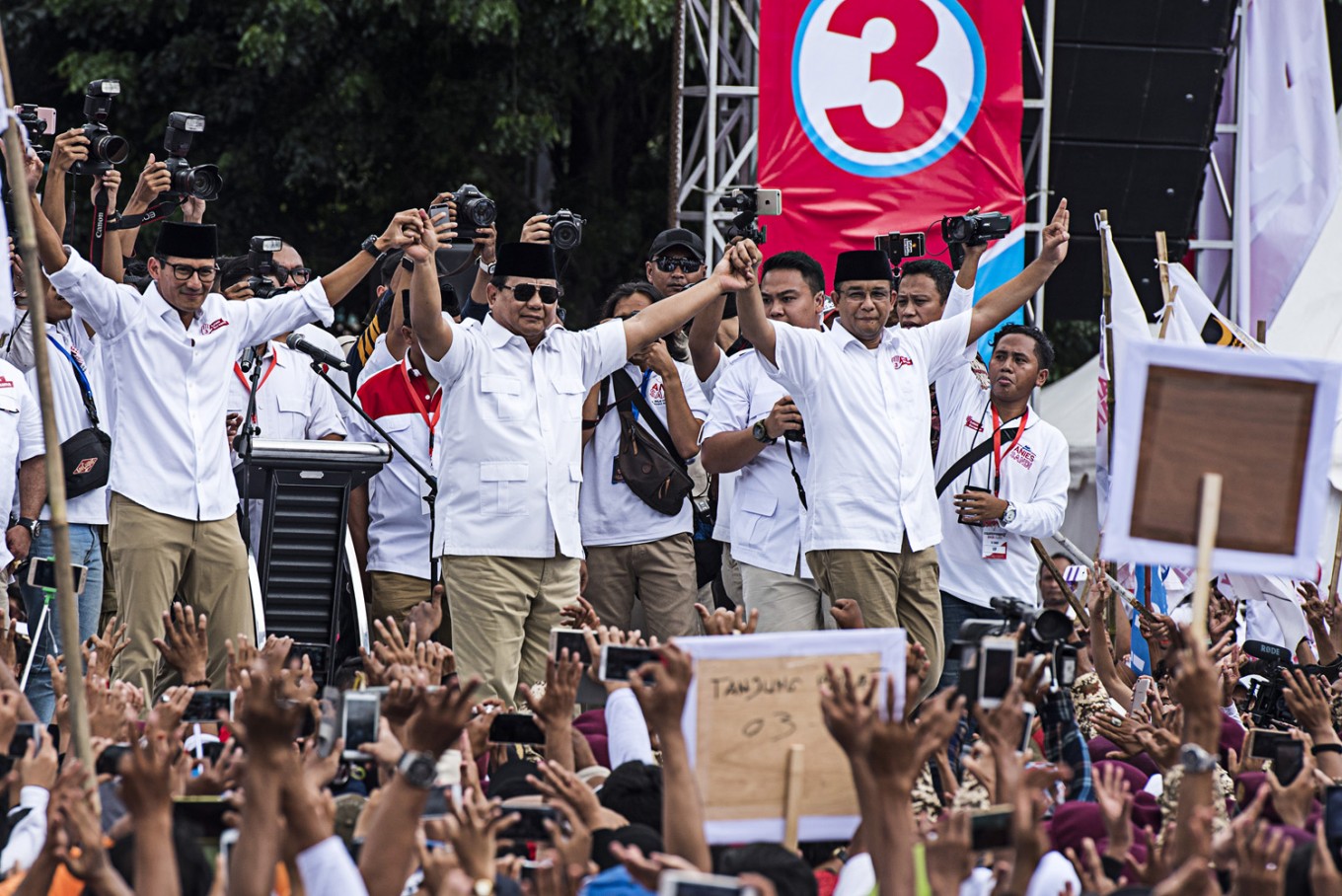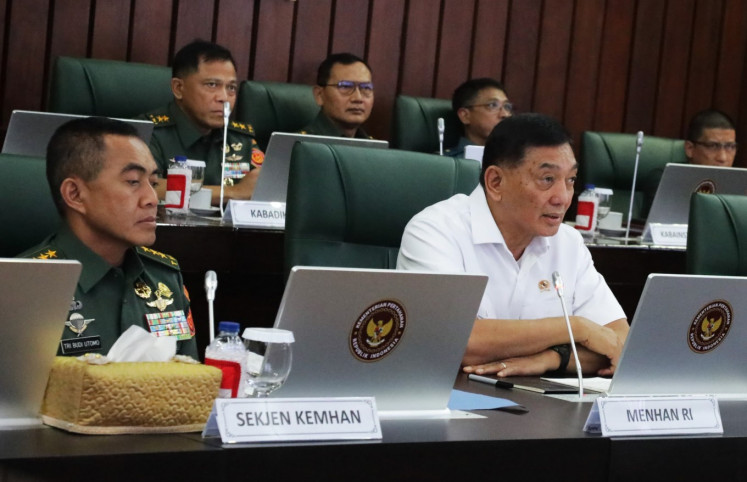Popular Reads
Top Results
Can't find what you're looking for?
View all search resultsPopular Reads
Top Results
Can't find what you're looking for?
View all search resultsIf Prabowo runs again in 2024, who will stop him? Anies?
If political parties behave as they did in the past, Prabowo and Anies would have the biggest chance of clinching a nomination. So who will back Anies and Prabowo? Would they run on the same ticket?
Change text size
Gift Premium Articles
to Anyone
I
f you are a die-hard supporter of President Joko “Jokowi” Widodo and his ally, Basuki “Ahok” Tjahaja Purnama, here’s a heads up: There is a huge possibility that Gerindra Party leader Prabowo Subianto will run again in 2024, and with Jokowi constitutionally barred from seeking a third term, his strongest potential contender is, at least for now, Jakarta Governor Anies Baswedan.
It is perhaps way too early to speculate if the former commander of the Army’s Special Forces (Kopassus) will, for the second time, have to fight another Jakarta governor who owes his election and political ascent to Prabowo to clinch the presidency.
Such a possibility, however, is not at all far-fetched. Here’s why.
Indonesian political parties, with the exception of the Golkar Party’s experiment years ago, do not hold a presidential primary in which voters or party members choose a presidential nominee, with presidential hopefuls joining public debates and competing for the nomination.
Here the elites always get to decide who runs for president. In such an elitist procedure, political pragmatism and also clientelism play a key role in presidential nominations, meaning only those with the highest electability and strong financial support win nomination.
On paper, Prabowo will be the most popular candidate to contest the 2024 election with an electability of more than 40 percent, although at that time he will turn 72 years old. Remember: Neither Gerindra nor Prabowo have shut down the possibility of him running for election again.
Trailing Prabowo is Anies, widely seen as the strongest among the younger candidates for at least two reasons: He leads the capital and is thus constantly in the spotlight, and seems to have the backing of the Islamist groups, particularly after Prabowo made peace with Jokowi.
Other popular regional leaders, including Central Java Governor Ganjar Pranowo, West Java Governor Ridwan Kamil and East Java’s Surabaya Mayor Tri “Risma” Rismaharini, have been tipped as potential candidates too, along with scions of the nation’s political dynasties like Puan Maharani and Agus Yudhoyono.
Ganjar and Risma, both members of the Indonesian Democratic Party of Struggle (PDI-P), will have to compete with Puan to get the blessing of party leader and Puan’s mother, Megawati Soekarnoputri, who still has the final say on the party’s presidential nomination. But Puan is unfortunately no match for even Ridwan, let alone Anies and Prabowo.
If political parties behave as they did in the past, Prabowo and Anies would have the biggest chance of clinching a nomination. So who will back Anies and Prabowo? Would they run on the same ticket?
Major political events after the April 17 election may have given us a clue to the political landscape in 2024, and signs suggest a face-off between Prabowo and Anies.
One crucial event is the Megawati-Prabowo meeting. Both leaders have buried the hatchet and agreed to form a partnership in the legislative body, even though, strangely, Gerindra is technically still an opposition party.
Such a gesture only makes sense politically if we look at it with 2024 — and its political machinations — as a backdrop. Thus, while Prabowo’s meeting with Jokowi at an MRT station earlier this month was merely a closure to a bitter and divisive presidential election, Prabowo’s lunch with Megawati actually marks the opening of a new political chapter between the two nationalist parties.
The consequence is crystal clear: The PDI-P and Gerindra have removed any political or psychological barriers that could prevent them from joining forces in the next election. With Prabowo practically straining his relations with the Islamists, some of whom have called him a “traitor” for the chummy MRT meeting, Megawati could finally fulfill her promise to nominate Prabowo, her former vice-presidential candidate, by pairing him with her true political heirs, Puan or Prananda Prabowo.
Other members of the ruling coalition, which are visibly uncomfortable with the turn of events at Megawati’s house on Jl. Teuku Umar, have held a meeting without the PDI-P in an apparent jab at Megawati and her renewed friendship with Prabowo.
NasDem party leader Surya Paloh then met Anies, who is a cofounder of the National Democrats, a progeny of the NasDems, at the party’s headquarters, fueling speculation it was considering nominating Anies for 2024. Considering the NasDems’ past political choices, including a plan to revoke its support for Ahok following the blasphemy controversy, nominating Anies — with his rising electability — is possible.
Anies, a former Jokowi ally, is no stranger to political expediency and seemingly capable of breaking ties with and taking on Prabowo, whose pivot to the PDI-P may have paved the way for Anies to collect support not only from the upset Islamists but also the angry parties in the government.
With the presidential threshold set at 20 percent, it is mathematically possible to have a third or fourth ticket, but it is politically unrealistic to expect smaller political parties to set up their own coalition to challenge the big parties; they are naturally drawn to a bigger coalition with a strong candidate.
In 2018, we saw how political pragmatism, coupled with restrictive electoral regulations, forced parties to nominate the same old candidates despite fears of the rising number of nonvoters due to the lack of better options.
For those who did not vote for Prabowo and Anies, the prospect of having to choose between them sounds like a nightmare. But regardless of your opinion about the two men, we obviously need more people running for election.
We could have more options by pushing lawmakers to revise the 2017 Election Law and scrap the presidential threshold to allow each party to field its own candidate.
So, who will challenge Prabowo and Anies if they run for president in 2024? A lot, you say. The problem is will they be able to join the race with the current electoral system still in place?










